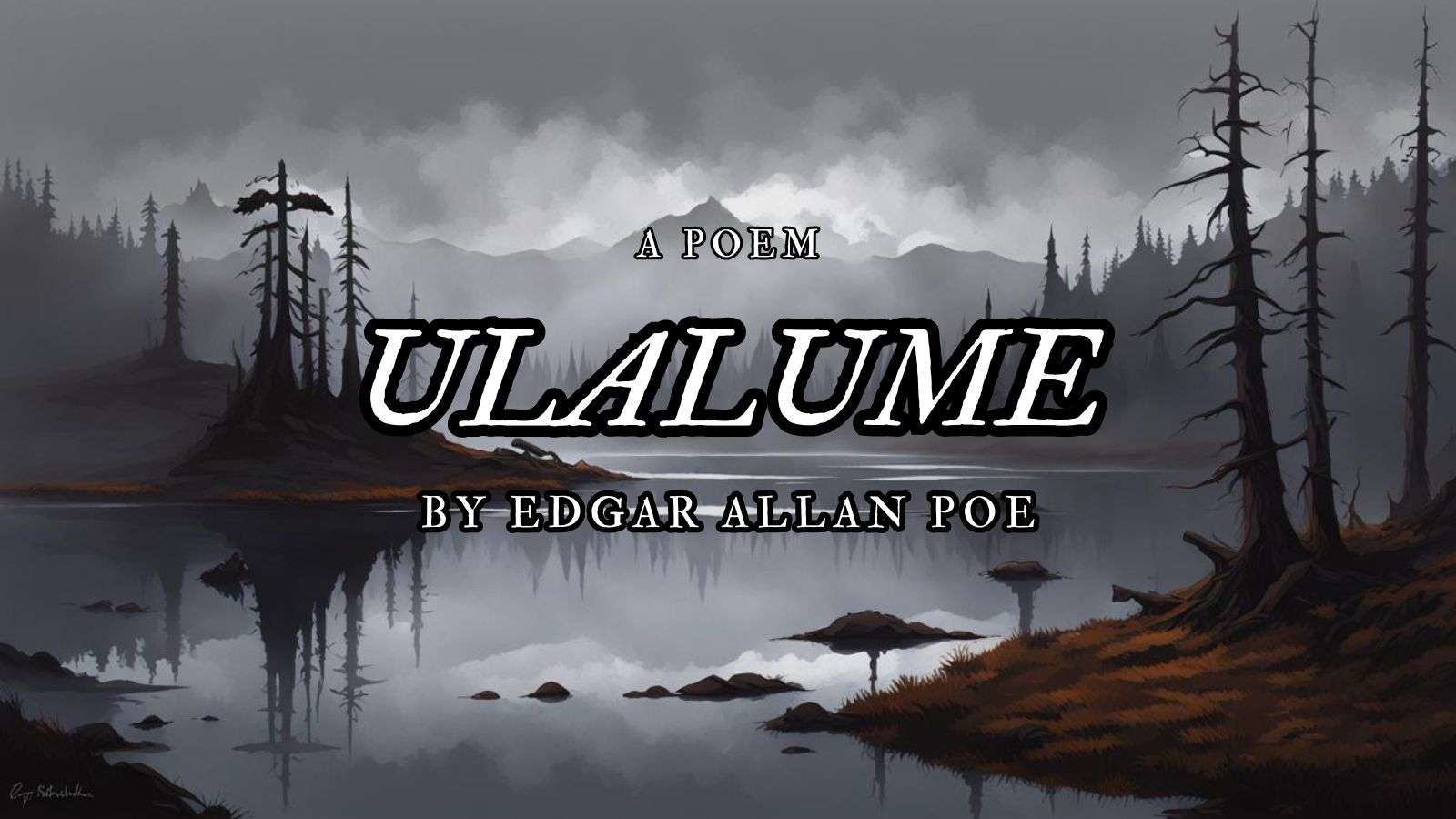ULALUME
by Edgar Allan Poe
The skies they were ashen and sober;
The leaves they were crispéd and sere,
The leaves they were withering and sere;
It was night in the lonesome October
Of my most immemorial year; 5
It was hard by the dim lake of Auber,
In the misty mid region of Weir:
It was down by the dank tarn of Auber,
In the ghoul-haunted woodland of Weir.
Here once, through an alley Titanic 10
Of cypress, I roamed with my Soul—
Of cypress, with Psyche, my Soul.
These were days when my heart was volcanic
As the scoriac rivers that roll,
As the lavas that restlessly roll 15
Their sulphurous currents down Yaanek
In the ultimate climes of the pole,
That groan as they roll down Mount Yaanek
In the realms of the boreal pole.
Our talk had been serious and sober, 20
But our thoughts they were palsied and sere,
Our memories were treacherous and sere,
For we knew not the month was October,
And we marked not the night of the year,
(Ah, night of all nights in the year!) 25
We noted not the dim lake of Auber
(Though once we had journeyed down here),
Remembered not the dank tarn of Auber
Nor the ghoul-haunted woodland of Weir.
And now, as the night was senescent 30
And star-dials pointed to morn,
As the star-dials hinted of morn,
At the end of our path a liquescent
And nebulous lustre was born,
Out of which a miraculous crescent 35
Arose with a duplicate horn,
Astarte’s bediamonded crescent
Distinct with its duplicate horn.
And I said—”She is warmer than Dian:
She rolls through an ether of sighs, 40
She revels in a region of sighs:
She has seen that the tears are not dry on
These cheeks, where the worm never dies,
And has come past the stars of the Lion
To point us the path to the skies, 45
To the Lethean peace of the skies:
Come up, in despite of the Lion,
To shine on us with her bright eyes:
Come up through the lair of the Lion,
With love in her luminous eyes.” 50
But Psyche, uplifting her finger,
Said—”Sadly this star I mistrust:
Her pallor I strangely mistrust:
Oh, hasten!—oh, let us not linger!
Oh, fly!—let us fly!—for we must.” 55
In terror she spoke, letting sink her
Wings until they trailed in the dust;
In agony sobbed, letting sink her
Plumes till they trailed in the dust,
Till they sorrowfully trailed in the dust. 60
I replied—”This is nothing but dreaming:
Let us on by this tremulous light!
Let us bathe in this crystalline light!
Its sibyllic splendor is beaming
With hope and in beauty to-night: 65
See, it flickers up the sky through the night!
Ah, we safely may trust to its gleaming,
And be sure it will lead us aright:
We safely may trust to a gleaming
That cannot but guide us aright, 70
Since it flickers up to Heaven through the night.”
Thus I pacified Psyche and kissed her,
And tempted her out of her gloom,
And conquered her scruples and gloom;
And we passed to the end of the vista, 75
But were stopped by the door of a tomb,
By the door of a legended tomb;
And I said—”What is written, sweet sister,
On the door of this legended tomb?”
She replied—”Ulalume—Ulalume— 80
‘T is the vault of thy lost Ulalume!”
Then my heart it grew ashen and sober
As the leaves that were crisped and sere,
As the leaves that were withering and sere,
And I cried—”It was surely October 85
On this very night of last year
That I journeyed—I journeyed down here,
That I brought a dread burden down here:
On this night of all nights in the year,
Ah, what demon has tempted me here? 90
Well I know, now, this dim lake of Auber,
This misty mid region of Weir:
Well I know, now, this dank tarn of Auber,
This ghoul-haunted woodland of Weir.”
###
Edgar Allan Poe (1809-1849) was an American writer, poet, critic and editor best known for his tales of mystery and horror. He is considered a central figure in the American Romantic movement and was one of the first American practitioners of the short story.
Poe was born in Boston to actress Elizabeth Arnold Hopkins Poe and actor David Poe Jr. His father abandoned the family when Poe was a toddler and his mother died of tuberculosis when he was two, leaving him orphaned. He was taken in by the wealthy tobacco merchant John Allan and his wife Frances in Richmond, Virginia.
Though never formally adopted, Poe took Allan as his middle name. He had a strained relationship with John Allan who did not support his literary ambitions. As a young man Poe attended the University of Virginia but was forced to drop out due to lack of funds.
His publishing career began in 1827 with the poetry collection Tamerlane and Other Poems. In 1835 he became editor of the Southern Literary Messenger in Richmond. He later lived in Philadelphia working as editor for magazines like Burton’s Gentleman’s Magazine and Graham’s Magazine.
It was during this time that Poe established himself as a critical reviewer and published many of his most famous stories, including “The Fall of the House of Usher,” “The Tell-Tale Heart,” “The Pit and the Pendulum,” and “The Murders in the Rue Morgue.”
Known for his Gothic, macabre themes and melancholic tone, Poe pioneered the modern detective story and helped define early science fiction. He married his cousin Virginia Clemm in 1836 who died of tuberculosis in 1847. Poe himself died under mysterious circumstances at the age of 40 in 1849.
Though not widely recognized during his lifetime, Poe’s stories and criticism have had a profound and lasting influence on American and international literature. He is now considered one of the most significant writers of the 19th century.
